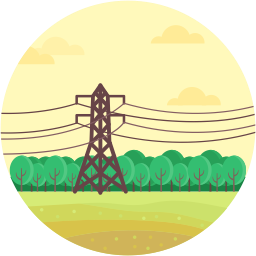 In the United States, the Public Utility Commission (PUC) is an organization that deals with rates and services provided by utility companies. More specifically, it’s a government entity that can go by several names including:
In the United States, the Public Utility Commission (PUC) is an organization that deals with rates and services provided by utility companies. More specifically, it’s a government entity that can go by several names including:
- Utilities Commission (UC)
- Public Services Commission (PSC)
- Utility Regulatory Commission (URC)
So, when does a PUC form and what exactly does it do for the people that require its services?
PUC & Energy Deregulation
PUCs are located in both regulated and deregulated markets — deregulated markets include:
- Delaware
- Texas
- Illinois
- Ohio
- Maryland
- Maine
- Connecticut
- Massachusetts
- New York
- New Jersey
- New Hampshire
- Washington D.C.
- Oregon
- Pennsylvania
- Michigan
PUCs form in deregulated states in order to keep better track of the utility and the electricity providers. Making sure that electricity providers operate ethically is in important role and responsibility of the PUC.
Responsibilities of PUCs
There is a little bit more to monitoring and regulating the utility, electricity and electricity providers than meets the eye. In addition, there are several other responsibilities the PUC has when it comes to electricity and consumers.
Some of the electricity specific responsibilities include:
Control Utility Delivery Rates
Despite the fact that the electricity provider handles supply related services, the utility is still a major player in how consumers receive electricity. Delivery rates for electricity, for example, is a cost that is proposed by the utility but is accepted and approved by the PUC.
This type of control really helps to keep consumers better protected from rates that jump too high. Without this, the utility could really charge whatever they like, which would not benefit the consumer paying for those services.
Consumer Protection
One of the major reasons for the PUC to exist is to protect the consumer from unethical energy related issues. For example, individuals pretending to be electricity provider sales or marketing agents can sometimes scam consumers, or they might get into a dispute with the electricity provider.
The PUC is the one place where a consumer can go to file a complaint. These complaints are taken very seriously, as the PUC’s primary goal is to make sure that the consumer fairly receives electricity at affordable rates. If an electricity provider or utility behaves in a way that the PUC deems unethical, they can step in to help solve and resolve the issue.
Manage Competitive Market
PUC’s formed in response to electricity deregulation, in order to prevent electricity providers from establishing their own set of rules. Even with competition, without management or regulation, the participating organizations would simply make up their own rates and services. For every state that is energy deregulated, the PUC enforces the laws set out and then manages them moving forward.
Overall, PUC’s all have similar agendas and follow similar mission statement. For example, the Pennsylvania PUC’s mission statement is, “Public Utility Commission balances the needs of consumers and utilities; ensures safe and reliable utility service at reasonable rates; protects the public interest; educates consumers to make independent and informed utility choices; furthers economic development; and fosters new technologies and competitive markets in an environmentally sound manner.”
If we compare this to the Public Utility Commission of Texas’ mission statement it becomes clear that the PUC as a whole aims to protect the consumer: “The Public Utility Commission of Texas regulates the state’s electric, telecommunication, and water and sewer utilities, implements respective legislation, and offers customer assistance in resolving consumer complaints.”
PUC Divisions and Departments
The PUC generally supports all of the different utilities consumers require including,
Telecommunications: This refers to phone services offered by telephone service providers. Their regulations differ from electricity but are managed by the PUC as well.
Water/Wastewater: The water that people drink, use to wash dishes, and flush the toilet, all need to be managed by the PUC.
Natural Gas: This type of energy is available in all states. Only some states offer natural gas under energy deregulation. Natural gas requires the PUC to provide the same type of regulation, control and management as electricity.
Transportation: Cities and locations that have bus and train services offered to the public are also regulated by the PUC. The PUC makes sure that consumers pay reasonable fare rates in addition to keeping vehicles and other equipment in good working condition.
Customer Choice Programs
Many of the PUCs that operate in energy deregulated states run customer choice programs. The purpose of these programs is to provide all the information a consumer needs in order to make an objective choice regarding an electricity provider.
Some of these PUC run programs include:
- Apples to Apples Ohio
- Energize Connecticut
- New York Power to Choose
- PA Power Switch
- Power to Choose Texas
- Plug In Illinois
- Maryland Electric Choice
- Maine Public Advocate
Alternatively, websites like ours allow consumers to shop for exclusive electricity rates and plans from providers. Electric Choice has been in business for over a decade and has helped tens of thousands of homes and businesses sign up for energy.


